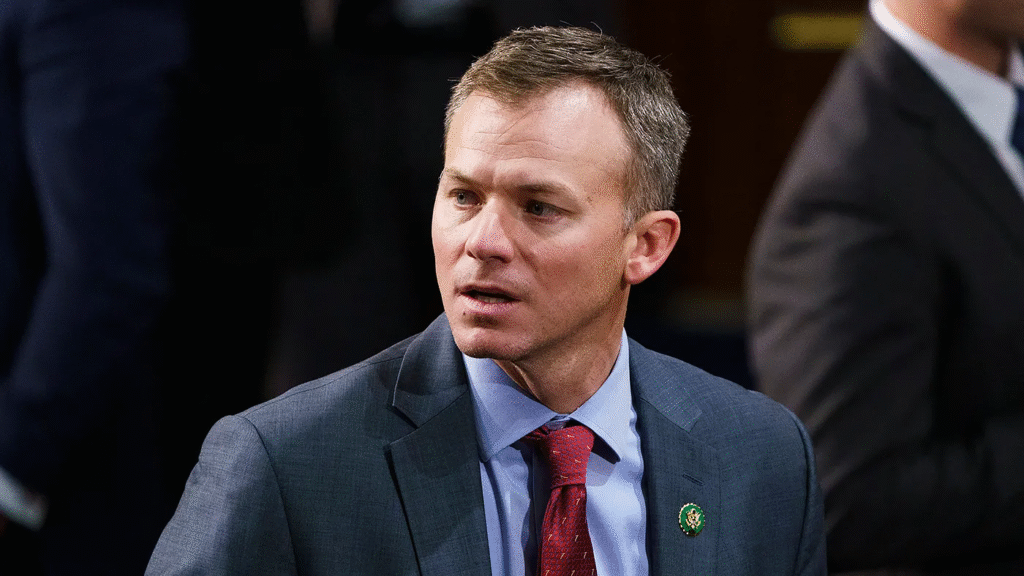
In a surprising and widely circulated moment that caught the public’s attention, Congressman Blake Moore was seen dozing off during an important political meeting. This incident, which could easily have been overlooked, quickly became a viral topic across social media and news platforms. While some reacted with amusement, others used the moment to spark a deeper conversation about the intense pressures faced by lawmakers and the toll politics takes on their health and alertness.
The image of a sitting congressman, caught in a moment of exhaustion, serves as a powerful reminder that behind the polished facades of politics lie human beings subject to fatigue and stress, just like anyone else. This episode invites us to consider the demanding nature of political life and how it impacts those who devote themselves to public service.
The Incident That Made Headlines
The meeting in question was no ordinary gathering. It was part of a legislative session tasked with tackling pressing national issues—debates that required intense focus, negotiation, and decision-making. Yet, despite the importance of the discussion, Congressman Moore’s exhaustion overcame him, and he briefly fell asleep.
Captured on camera, the moment became public almost immediately. News organizations broadcast the footage, and social media users reacted instantly, sharing clips and images with commentary ranging from sympathy to criticism. The incident highlighted the physical and mental toll that public office can exact on elected officials.
The Reality of Political Workload
Politics is often glamorized as a profession of influence and power, but the reality behind the scenes is far more complex and demanding. Lawmakers like Moore face relentless schedules filled with committee meetings, legislative sessions, constituency work, public appearances, and campaigning. Many of these commitments stretch late into the night, leaving little time for rest or personal life.
Research has shown that politicians often work longer hours than many other professionals. For example, members of Congress regularly spend 60 to 80 hours per week managing their multifaceted duties. The workload is compounded by travel between their home districts and Washington, D.C., which can further disrupt sleep patterns and increase fatigue.
Mental strain is another critical aspect. Lawmakers must absorb vast amounts of information, master complex policy issues, and engage in high-stakes negotiations—all while under constant media scrutiny and public expectation. The psychological demands can lead to stress and burnout, making moments of physical exhaustion inevitable.
Public Reaction: Humor, Sympathy, and Scrutiny
The public’s response to Moore’s nap was multifaceted. On one hand, many people sympathized with him, recognizing the shared experience of fatigue that transcends professions. Countless workers, students, and caregivers alike have found themselves nodding off at inopportune times due to exhaustion. This humanizing perspective encouraged empathy and understanding for the congressman.
On the other hand, some expressed disappointment and criticism. These voices argued that lawmakers hold a sacred responsibility to remain vigilant and professional, especially during critical meetings where important decisions affecting millions are made. Falling asleep, from this point of view, raised questions about commitment and preparedness.
Interestingly, the incident also sparked a wave of humor. Social media users created memes and witty commentary, drawing parallels between Moore’s exhaustion and the fatigue felt by everyday citizens juggling demanding jobs and personal responsibilities. This blend of levity and critique reflected the complex public attitudes toward political figures and their human vulnerabilities.
Behind Closed Doors: The Pressure Cooker of Politics
While the public witnessed only a brief moment of sleep, the reality behind political meetings is far more intense. Legislatures are arenas of debate, negotiation, and strategic maneuvering. Lawmakers face pressure not only from their colleagues and party leadership but also from lobbyists, constituents, and the media. The stakes are high, and the environment can be unforgiving.
Political meetings can last for hours, sometimes extending into the early morning, with back-to-back sessions and minimal breaks. The demand to stay constantly alert, absorb dense information, and respond quickly to changing dynamics takes a heavy toll. For lawmakers like Moore, the physical exhaustion seen in public is often the visible tip of a much larger iceberg of stress and fatigue.
The Challenge of Public Expectations vs. Human Limits
The Moore incident sheds light on a broader societal challenge: the expectation that politicians must be tireless, flawless figures immune to fatigue. This unrealistic ideal often clashes with the reality of human physiology and mental health. The political arena demands long hours and intense concentration, but the body and mind have natural limits.
Recently, conversations about mental health and wellbeing in politics have gained traction. Some governments have begun introducing wellness programs and support systems for lawmakers, acknowledging the need to balance performance with self-care. Destigmatizing fatigue and stress among politicians is an important step toward healthier governance.
Reevaluating Political Work Culture
Congressman Moore’s nap invites reflection on the culture of political work itself. Long, marathon sessions and relentless schedules may have once been the norm, but evidence suggests these practices can be counterproductive. Fatigue impairs decision-making, reduces focus, and increases the risk of mistakes.
Around the world, some parliaments and legislative bodies have started experimenting with reforms. These include shorter meeting times, more frequent breaks, and the introduction of remote or hybrid sessions to reduce travel-related exhaustion. Such changes aim to foster greater efficiency and wellbeing among lawmakers.
Congressman Blake Moore’s Response and Public Reflection
After the incident gained attention, Congressman Moore addressed it publicly. He acknowledged his exhaustion and the demanding nature of his schedule, expressing gratitude for the understanding he received. Moore’s transparency was widely seen as a positive step toward normalizing discussions about fatigue and wellbeing in politics.
His response also sparked broader reflection on how political institutions and the public can foster environments that support human limits without compromising accountability or effectiveness. It underscored the importance of compassion in assessing politicians’ performances.
Accountability and Transparency in Political Leadership

While empathy is vital, accountability remains a cornerstone of political leadership. Lawmakers must ensure they fulfill their duties with dedication and professionalism. The Moore incident reminds us that accountability and understanding need not be mutually exclusive.
Transparency about the challenges of political life can build trust and encourage more realistic expectations. Politicians who openly discuss their struggles humanize themselves and may inspire institutional changes that support their health and job performance.
The Media’s Role in Political Narratives
The media plays a crucial role in shaping how political incidents like Moore’s nap are perceived. Sensationalist coverage can lead to ridicule or unfair judgments, while responsible journalism provides context and nuance.
Balanced reporting highlights the pressures lawmakers face and encourages informed public discussion. It also holds politicians accountable without resorting to dehumanization or sensationalism, fostering a healthier political culture.
Political Fatigue as a Symptom of Larger Systemic Issues
Moore’s exhaustion is not an isolated incident but reflects broader systemic challenges within political institutions. The relentless pace, adversarial dynamics, and increasing public scrutiny contribute to high levels of stress and burnout among elected officials worldwide.
Addressing these issues requires institutional reforms, such as reasonable working hours, mental health support, and changes in political culture that prioritize sustainability and wellbeing alongside productivity.
Constituent Perspectives: Balancing Expectations and Empathy
For voters, seeing their representative fall asleep during a meeting can evoke mixed feelings. Some appreciate the glimpse of humanity, while others worry about attentiveness and effectiveness. This incident encourages constituents to weigh politicians’ imperfections alongside their overall commitment and achievements.
It also highlights the importance of public engagement and dialogue about political work conditions, fostering mutual understanding between lawmakers and those they serve.
Historical Parallels: Politicians and Public Fatigue
Throughout history, politicians have faced moments of exhaustion and lapses in public settings. From President Lyndon B. Johnson reportedly falling asleep in meetings to various lawmakers nodding off during sessions, these moments humanize leaders and remind us of the physical demands of public service.
Examining these cases reveals patterns in public reaction and the ongoing negotiation between human vulnerability and political expectation.
The Future of Political Work: Toward Sustainability and Health
As the demands of governance grow increasingly complex, political institutions must adapt. Innovations like virtual meetings, enhanced wellness programs, and workload management tools offer potential solutions to reduce fatigue.
Congressman Moore’s moment serves as a call to action for legislators, administrators, and citizens to collaborate in creating political work environments that sustain both health and effectiveness.
Conclusion
The incident involving Congressman Blake Moore falling asleep during a political meeting is far more than a viral moment—it is a reflection of the immense pressures placed on public officials and the human limits that come with them. It challenges us to reconsider our expectations of politicians and the structures that govern their work.
By fostering empathy, encouraging transparency, and pursuing institutional reforms, we can support the wellbeing of those who dedicate their lives to public service. Doing so will ultimately strengthen the quality and sustainability of governance, benefiting both lawmakers and the communities they represent.

